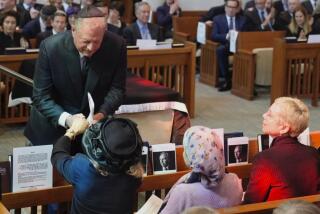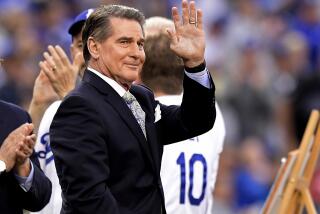Born to Politics, Gore Fits the Ticket’s Needs : Profile: He provides Washington experience, expertise on key issues, a nearly unassailable history of conduct.
- Share via
WASHINGTON — Born to politics, Albert Gore Jr. romped as a child through the corridors of power where he now serves as senator, frequently encountering such famous men as Richard M. Nixon, Lyndon B. Johnson and John F. Kennedy, whose quest for the presidency he would later emulate.
Thus, while the 44-year-old Tennessean selected to be Democrat Bill Clinton’s running mate is--like Clinton himself--a member of the baby boom generation, his experience in politics has been tempered by a lifelong presumption of power and influence.
“Prince Albert,” some have called him. The son of former Sen. Albert Gore Sr. and heir to a family tradition of political activism, Gore brings to the Democratic ticket some traits that Clinton appears to lack: Washington experience, a nearly unassailable history of personal conduct, a record of military service and a proven grasp of such key national issues as the environment and defense.
Gore, whose handsome good looks have sometimes been compared to those of actor Christopher Reeve, has been on a political fast track all of his life. He was captain of the high school football team, won his first election to Congress at age 29 and mounted an unsuccessful bid for President in 1988, before he had turned 40.
By virtue of his years of service in Washington, Gore clearly has developed different political strengths than Clinton. While the Arkansas governor steeped himself in the issues of education and social policy, Gore tackled more global concerns: arms control and preserving the world’s environmental balance.
Unlike Clinton, the product of an unhappy, middle-class home in small-town Arkansas, Gore grew up in the embrace of privilege. He lived with his family in the elegant old Fairfax Hotel on Washington’s Embassy Row and attended the finest schools, graduating with honors in 1969 from Harvard University.
Unlike Clinton, who opposed the Vietnam War and avoided the draft, Gore enlisted in the Army after graduation from Harvard and served in Vietnam, even though his family opposed the war. He apparently toyed with draft resistance, but rejected the idea because he feared it would have a negative impact on his father’s political career.
Unlike Clinton, who has admitted having caused pain in his marriage, Gore has the reputation of a committed family man. He is the father of four children. His wife, Mary Elizabeth (Tipper), whom he met at the senior prom, has made a career of campaigning against sexually explicit rock ‘n’ roll lyrics.
In fact, Gore’s reputation for rectitude is such that his admission during his 1988 presidential campaign of a youthful indulgence in marijuana didn’t cause the slightest political ripple.
Gore’s close-knit family has been drawn even closer together since his son, Albert, at age 6, was struck and nearly killed by a car after attending a baseball game in Baltimore in April, 1989. It was an event that strongly reaffirmed Gore’s devotion to family life.
“Al Gore fills in and fits some of the things that Clinton needs,” noted John Bragg, a Democratic state legislator in Tennessee who has known Gore since childhood. “He is a perfect choice.”
Still, there is little chance that Gore will outshine the presidential nominee. For all of his big-city sophistication and smoothness, Gore lacks the genuine gregariousness and sense of humor frequently displayed by Clinton.
In fact, his funniest remark about his unsuccessful 1988 presidential bid was a self-deprecating joke about his own humorlessness. “How can you tell Al Gore from a roomful of Secret Service agents?” he asked. Answer: “He’s the stiff one.”
During that campaign, a number of lawmakers and aides who had worked with him in the Congress said they considered Gore to be at once a publicity-conscious grandstander and an aloof outsider.
One Democratic aide said then that Gore “was arrogant. He loved being the best looking and the smartest boy in class, and he felt he didn’t need them (his colleagues) to succeed.”
If that is true, Gore may come by some of that demeanor naturally. His father, who served in Congress for most of three decades and was ousted from the Senate in 1970 by William E. Brock III, angered many of his congressional colleagues over the years with an unyielding devotion to his own point of view.
While young Al has all of the politeness and polish that his father lacked, he often appears to be just as seriously committed to his own political positions as Albert Sr.
Gore, who spent a few years working as a reporter before entering politics, is said to be one of the biggest users of the Library of Congress and has devoted months of his life to the study of global warming and the strategic nuclear balance between the United States and the Soviet Union.
Yet Gore’s politics are more moderate than the staunch liberalism of his father. Indeed, he often charts a different course than his Democratic colleagues in the Senate and is sometimes accused of taking politically expedient positions.
Last year, for example, when the Senate Democratic leadership opposed Bush’s commitment of troops to the Persian Gulf, Gore voted with the Republicans while at the same time defending the position of his fellow Democrats. “There are no perfect choices,” he insisted.
As a member of Congress, Gore took a leadership role beginning in the early 1980s in trying to change the image of Democrats as soft on defense. In an effort to counter the Ronald Reagan Administration’s reliance on the heavy, 10-warhead MX missile, Gore led Democrats in a battle for development of the single-warhead Midgetman. Although it succeeded in giving liberal Democrats a political alternative, the Midgetman eventually was scrapped.
Gore’s leadership on environmental issues has been more successful. At the recent two-week Earth Summit in Rio de Janeiro, he was the most visible American present. He addressed both summit delegates and environmental activists, who held their own Global Forum several miles away.
Gore seized upon the issue of environmental protection after two important events in his life--his failed presidential bid in 1988 and the accident that nearly killed his son in 1989.
In 1988, Gore’s strategy was to sweep the Southern primaries. And while he made a good showing on Super Tuesday, he was forced to share the limelight with the Rev. Jesse Jackson. His candidacy then foundered in New York, where his alliance with former Mayor Edward I. Koch proved to be an embarrassment to him.
His son’s accident occurred as they were crossing a busy street after watching a baseball game in Baltimore. On impact, he was thrown 30 feet through the air and scraped along the pavement for 20 feet before landing in a gutter.
“I ran to his side and held him and called his name, but he was motionless,” Gore later recalled in his most recent book, “The Earth in Balance.” “His eyes were open with the nothingness stare of death and we prayed, the two of us, there in the gutter, with only my voice.”
That experience and his son’s long struggle for survival, he said, changed his view of everything--personal and public. “This life change has caused me to be increasingly impatient with the status quo, with conventional wisdom, with the lazy assumption that we can always muddle through.”
Gore chose not to run for President in 1992, saying that he had decided to devote more attention to his family. But even then, his closest friends felt he had not entirely put aside his long-term quest for higher office.
Although he was not raised in the South, Gore returns--as he has since childhood--to Carthage, Tenn., whenever Congress is in recess. He was there on the family’s 250-acre farm this week when he received the call from Clinton, asking him to take yet another step in what has long seemed to be a charmed political career.
More to Read
Get the L.A. Times Politics newsletter
Deeply reported insights into legislation, politics and policy from Sacramento, Washington and beyond. In your inbox twice per week.
You may occasionally receive promotional content from the Los Angeles Times.










